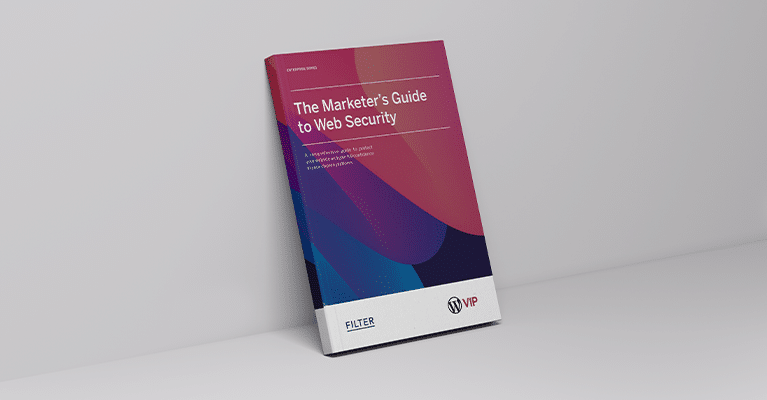
This article explains how to keep your website protected and secure, you will learn more about proactive measures to protect data. It also discusses the potential financial and reputational consequences of security breaches.

We all know cyber security is important, but despite being something we hear about online every day, many of us still underestimate just how critical an issue security is.
Research from Evanta, a Gartner company, found that cyber security strategy was the top business objective for chief information officers (CIOs) in 2023. If cyber security is the biggest concern that’s keeping CIOs up at night, it’s something every business should be paying close attention to.
One of the reasons CIOs are prioritising cyber security above everything else is because of how likely it is for a business to fall victim to a cyber security attack these days, and that likelihood is ever-increasing.
For instance, 59% of medium-sized businesses and 69% of large businesses in the UK have experienced security breaches or attacks in the past 12 months. With so much of your sensitive, mission-critical company and customer data stored online, it’s essential to keep your technology secure.
One particularly important security concern is your website. As one of your primary digital touchpoints with your prospects and customers, websites must be constantly monitored for a range of security vulnerabilities. Your data, and the data of your customers, will be susceptible to cyber security attacks if you don’t have robust website security in place.
Website security requires you to implement measures specifically designed to protect your sites from malicious attacks, unauthorised access, data breaches, and various other threats. This involves leveraging processes, best practices, and digital tools that will help you mitigate the many risks faced by your website.
The purpose of web security is to protect your site and your web platform, while maintaining the confidentiality, integrity, and availability of data, and preserving the trust of your customers.
A key rule to follow for website security, and cyber security in general, is to be proactive rather than reactive. If you wait for a security incident to happen before taking any action to reinforce your protection, it’s likely you’ll end up the victim of an attack or breach sooner than later.
Not only is the number of cyber security attacks increasing, but the impact a security breach can have on your business is also getting worse. For example, according to Cybersecurity Ventures, the cost of global cyber crime is expected to hit $8 trillion in 2023, and could grow to $10.5 trillion by 2025.
Since you now have so much of your sensitive data and mission-critical processes running digitally, there are greater risks involved with having insufficient website security. Beyond the financial losses you could potentially incur, there are other negative consequences as well.
From an SEO perspective, Google may also black-list your website off of its search engines if you succumb to a cyber attack. This would take away much of your ability to do business online.
There are also strict regulations in place that demand businesses take certain precautions to protect the data of their users, customers, and partners. Failing to comply with these regulations, or maintain website security, could result in legal issues down the line.
That’s not to mention the reputational damage you’d suffer from falling victim to a cyber attack that compromises your sensitive data. With all this in mind, website security must be a key focus for all marketers, if it isn’t one already.

Learn more about how to improve your website security, without sacrificing website performance or user experience by accessing our FREE eBook.
Website security is so complex and hard to maintain because there are so many different types of threats out there, with new ones emerging all the time. Some of the most common threats to keep up with include:
Malware is any software designed with malicious intent, such as computer viruses, often used to access private data or use server resources. This is a common approach that cyber criminals often use to attack business websites.
A more advanced type of malware, called ransomware, is used to access your website so hackers can then demand you pay a ransom for them to give back control.
Phishing attacks are a type of cyber crime where hackers pretend to be someone else in order to trick their targets into taking a harmful action, like clicking a link.
These attacks take your website offline by crashing it with an overload of traffic. This prevents your visitors from reaching you and, by rushing to get your server back online, you become more vulnerable to malware attacks.
Automated bots target websites by leaving enormous volumes of comments on web pages, often with phishing links and other malicious activity.
In addition to the various cyber security threats out there, the behaviour and actions of your users can also leave you vulnerable. In fact, more than 80% of cyber security attacks are due to some form of human error.
That’s not to say your users are deliberately compromising your security, but it does still mean it’s important to take action and protect your website from the mistakes those users can potentially make.
Most users cause security issues because they lack the awareness, understanding, or governance to work in line with security best practices. So, you should ensure that your organisation is providing education to your wider team about the importance of security. That could be through security-specific training, or by enforcing stricter policies and rules when using your technology, such as multi-factor authentication. Either way, you should aim to minimise your risks by enabling and encouraging your users to play a role in maintaining the required level of security.

This article discusses the importance of website security in light of growing cyber threats and provides six practical tips for enhancing website security.
There are also platform-specific website security considerations you must be aware of as well. Of course, your website is built on a technology platform, most likely a content management system (CMS). That platform is basically just a piece of software, and no piece of software is 100% immune to security risks.
With that in mind, you should always look into the various ways your platform could become more vulnerable than usual if not managed correctly. For example, if your site is built on WordPress, there are several things you’ll need to be mindful of:
WordPress sites, like most web platforms, are far more resilient and secure in an enterprise-grade managed hosting environment.
Using plugins that don’t come from trusted, recognised sources, or that aren’t regularly tested, maintained, and updated by the author, could cause security issues.
Any time a software update is released, you must test your platform to ensure the update hasn’t created any new security vulnerabilities for you.
While these aren’t technically security weaknesses of the WordPress platform, they are issues that could lead to problems if you don’t manage your site with security best practices in mind.
Having said that, WordPress is a very secure platform by itself, with a dedicated team of industry-leading security experts and a global community of vigilant developers providing added protection. Evidence of just how secure WordPress is can be found in the fact that 43% of all websites online today are built using WordPress.
The key point here is that you can significantly reduce the risk of a security breach by working in a more security-conscious way.
Don’t fall into the same trap that so many organisations have already fallen into, underestimating how likely – and how damaging – it is to suffer a security breach in 2023.
Website security should be treated as a mission-critical priority, and approached with a proactive mindset, preparing for the absolute worst outcomes. Moreover, website security can’t simply be considered “complete” once you’ve become compliant and put some basic security measures in place.
The sophistication and capabilities of cyber criminals are alway evolving, so your website security must be an ongoing priority in order to keep up. Regular security audits, automated monitoring and testing, and continuous learning are all essential for a secure website in 2023.
Here is a list of links to further your knowledge of Website Security.